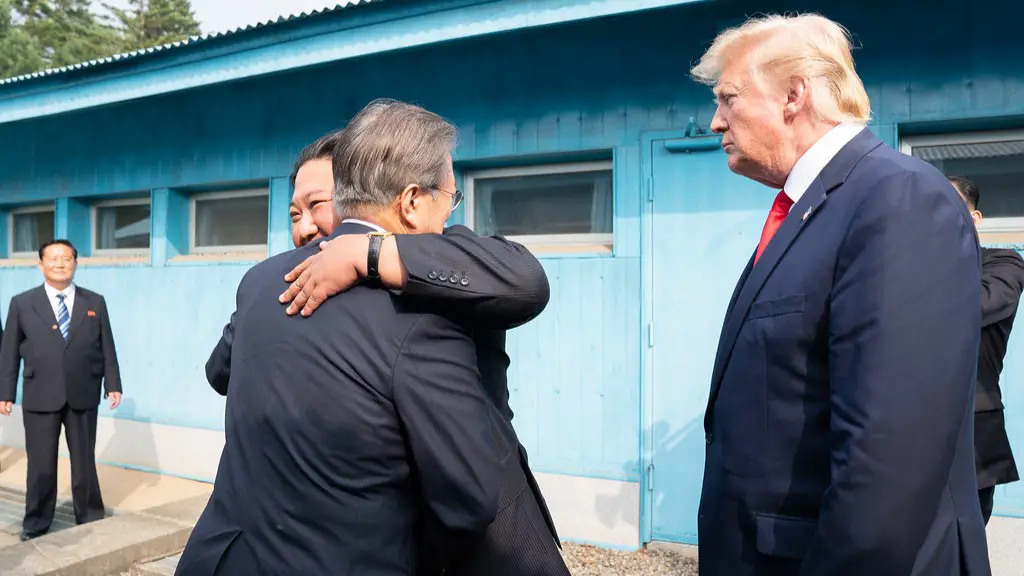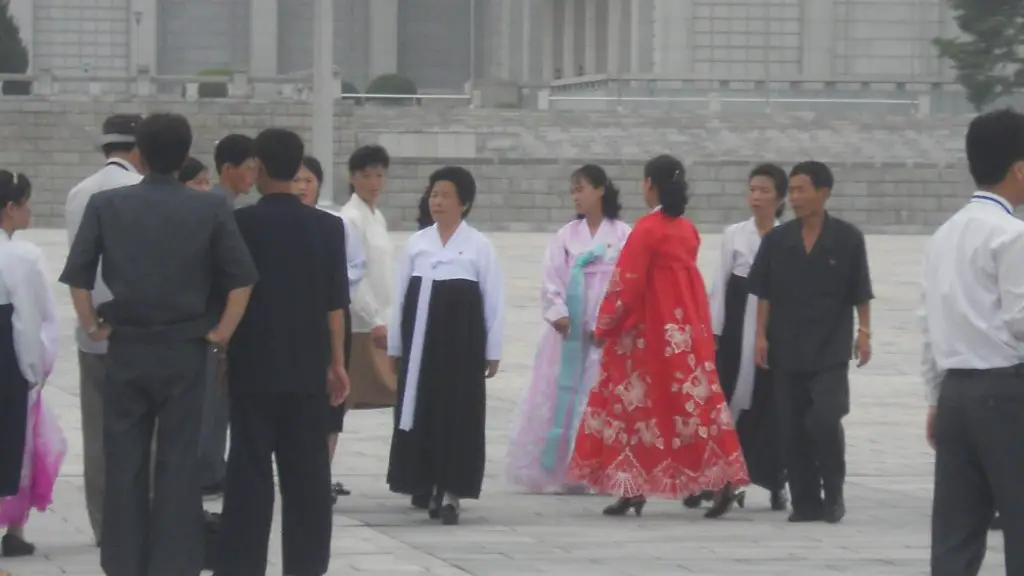In today’s ever-changing geopolitical landscape, speculation surrounds the highly precarious relationship between the United States and North Korea. It is no secret that the hermit kingdom has been a thorn in America’s side since the Korean War, developing nuclear weapons despite international sanctions, in an apparent effort to expand its power and influence. However, the question remains: Can America really defeat North Korea?
In order to answer this question, we must first consider North Korea’s ability to defend itself from a potential American attack. While North Korea maintains an extensive military; its lack of modern equipment and highly-trained personnel, however, limit its offensive capabilities. Recent examination of North Korea’s economy reveals an underdeveloped agriculture sector and an overall financial system heavily reliant on foreign aid and assistance. Despite having a large and varied arsenal of short and medium range missiles, the effectiveness and accuracy of these weapons is questionable due to technological limitations and the lack of skilled personnel to operate them.
The American military, on the other hand, is the most powerful in the world. Its financial resources, technological capabilities, and personnel are unparalleled. The American army is equipped with the most advanced military technology available and its strategic deployment around the world has been a cornerstone of American foreign and domestic policy for decades. Its capacity to execute quick strikes and long-term operations has been proven throughout numerous international crisis, making it the obvious choice to fend off North Korea if necessary.
In addition to its military superiority, America’s experience in geopolitical maneuvering and ability to implement violent solutions in order to achieve its objectives puts the nation in an advantageous position over North Korea. America’s pursuit of economic, technological and ideological mastery of the global arena has been an integral component of its foreign policy; this focus has provided the American government with an edge when it comes to confronting North Korea and other forces of instability in the region.
Leadership: North vs. South
The leaders of North and South Korea are also starkly different and highlight the disparate paths the two nations have followed. North Korea is currently led by Kim Jong Un, and despite his provocative and volatile rhetoric, he is more moderate and pragmatic than his father and grandfather, who ruled before him. By contrast, South Korea’s president, Moon Jae-in, is a progressive human rights advocate focused on diplomatic solutions to resolve the North Korean crisis. The different approaches of the two leaders signal that South Korea is likely to pursue a peaceful, yet firm, approach to resolving the tensions between the two countries, while North Korea is more likely to rely on an increasingly militaristic approach.
Nevertheless, while North Korea’s leadership may appear more volatile, it is not as great an obstacle to a successful American defeat as one might think. Despite bold rhetoric, North Korea’s actions are often more rational than those of its adversaries. North Korea’s isolationist policies, propaganda campaigns and invasive surveillance mechanisms have been put in place to ensure the survival of the regime, making it more cautious and aware of any potential risks its actions could pose to its own stability.
Furthermore, North Korea’s lack of diplomatic ties to other countries and its flaunted nuclear program has resulted in a number of economic sanctions imposed on the country. This has severely limited its ability to purchase foreign goods, slowed its economic development and impoverished its citizens, putting the North Korean leadership in a difficult position in which it must make the best of its limited resources.
International Factors
In addition to North Korea’s potential for military retaliation, the potential for international criticism and opposition is also a major factor in any American attack. In recent years, China has become increasingly vocal in its criticism of American foreign policy in the region and has made it clear that it would not stand to benefit from any military action against North Korea. Furthermore, recent thawing relations between China and North Korea could potentially give the hermit kingdom the upper hand in a conflict, as China might be more inclined to provide political and military support if the situation escalates.
Similar concerns have been raised regarding Russia, which has repeatedly sought to reassert itself as a major player in the international arena. A potential American attack on North Korea could be seen as a threat to Russia’s regional presence and lead to a clash between the two global powers. Such a scenario could result in a far-reaching conflict with unpredictable consequences.
It is also worth considering the potential impact that a military defeat of North Korea could have on the region. While a technical victory might be achieved, it is highly unlikely that it would be a peaceful transition. A successful attack on North Korea could undermine political and economic stability in the Korean Peninsula and its immediate vicinity. This could potentially result in chaos and further instabilities, leading to an extended period of unrest in the region.
The Possibility of Deterrence
Finally, the question of whether a successful attack on North Korea is even possible has to be considered. It is true that the American military has the capacity to mount a successful attack, but it could prove difficult to achieve the necessary level of deterrence without a direct confrontation. North Korea has, for years, been using a variety of tactics to keep its adversaries at bay, such as a policy of mutually assured destruction, a doctrine of unpredictability, a comprehensive system of surveillance and, most recently, a formidable arsenal of nuclear weapons.
The US has, in recent years, attempted to use economic pressure to try and force North Korea to the negotiating table, but so far these efforts have had limited success. The effectiveness of economic pressure is also limited by the fact that North Korea frequently gains access to foreign goods and currency through illicit and illegal activities, such as drug smuggling and money laundering. This has enabled the country to remain largely insulated from international pressure, making it difficult to build any kind of consensus around the issue.
Strategic Deterrence vs. Offensive War
It is therefore clear that any American offensive against North Korea would be a difficult and potentially costly endeavor, and that the possibility of a successful attack should be tempered with a sense of caution and strategic planning. While a military victory may be possible for the US, a more viable option could be to pursue a path of strategic deterrence, using a combination of economic and diplomatic pressure, as well as an increasingly sophisticated missile defense system to defend itself from any potential attack.
The US has already taken steps in this direction, strengthening alliances with Japan and South Korea, and signing an arms control agreement with China in an effort to de-escalate the North Korean crisis. The US must also continue to showcase its military prowess and strategic expertise in order to deter any potential aggression on the part of North Korea.
Sanctions and Pressure
Furthermore, the US must continue to impose strict economic sanctions on North Korea in order to bring the country to the negotiating table. America must also increase diplomatic pressure on the North Korean government, pushing for an end to the country’s nuclear weapons program and a return to negotiations. Such a path will require patience, persistence and a clear understanding of the delicate nature of the situation, in order to ensure a peaceful resolution to the North Korean conflict.
In conclusion, it is possible for America to defeat North Korea, but a direct military confrontation is likely to prove difficult and costly. A more viable alternative for the US may be to focus on strategic deterrence and international diplomacy in order to bring the rogue nation to the negotiating table and secure a peaceful outcome to the crisis. While America has the military superiority to win a direct confrontation, effective diplomacy may prove to be a more sustainable solution.
Limitations of Diplomacy
However, it is also important to note that diplomacy is often reliant on the good faith of both sides to negotiate in good faith, and the effectiveness of diplomatic approaches can sometimes be limited by the refusal of certain parties to cooperate. This can be seen in the strained relationship between the US and North Korea, which has been marked by a series of failed negotiations and increased tensions in recent years. As such, American strategy should not be overly reliant on diplomacy, as there is no guarantee of a positive outcome.
International Cooperation
It is also important to recognize the importance of international cooperation in any efforts to address the North Korean conflict. It is unlikely that the US will be able to bring about a satisfactory resolution to the crisis without the cooperation of China, Japan and Russia, amongst other parties. As such, any resolution to the crisis should include a multilateral approach, in which all states are given a meaningful role in the negotiations.
It is also essential that the US and its allies remain united in their approach to the North Korean crisis. Recent tension between Washington and Seoul has had a detrimental effect on diplomatic efforts and has further weakened the unity of the international community in tackling the Hermit Kingdom. The US must recognize the importance of unified action in order for any diplomatic solution to be effective.
The Importance of Deterrence
In addition to diplomatic efforts, the US must also focus on strengthening its deterrent capabilities in order to prevent a North Korean attack. The US has successfully used a combination of missile defense systems and economic sanctions in order to deter the North Korea from undertaking any military action, and this strategy should continue to be utilized. In addition, the US must also continue to maintain its military presence in the region in order to demonstrate its commitment to regional security and its willingness to act if necessary.
Ultimately, there is no one-size-fits-all approach to the North Korean crisis. The US must ensure that it pursues a multi-faceted strategy that combines economic pressure and military deterrence with diplomatic initiatives and robust international cooperation. This is the only way to ensure a peaceful resolution that benefits all parties concerned.





